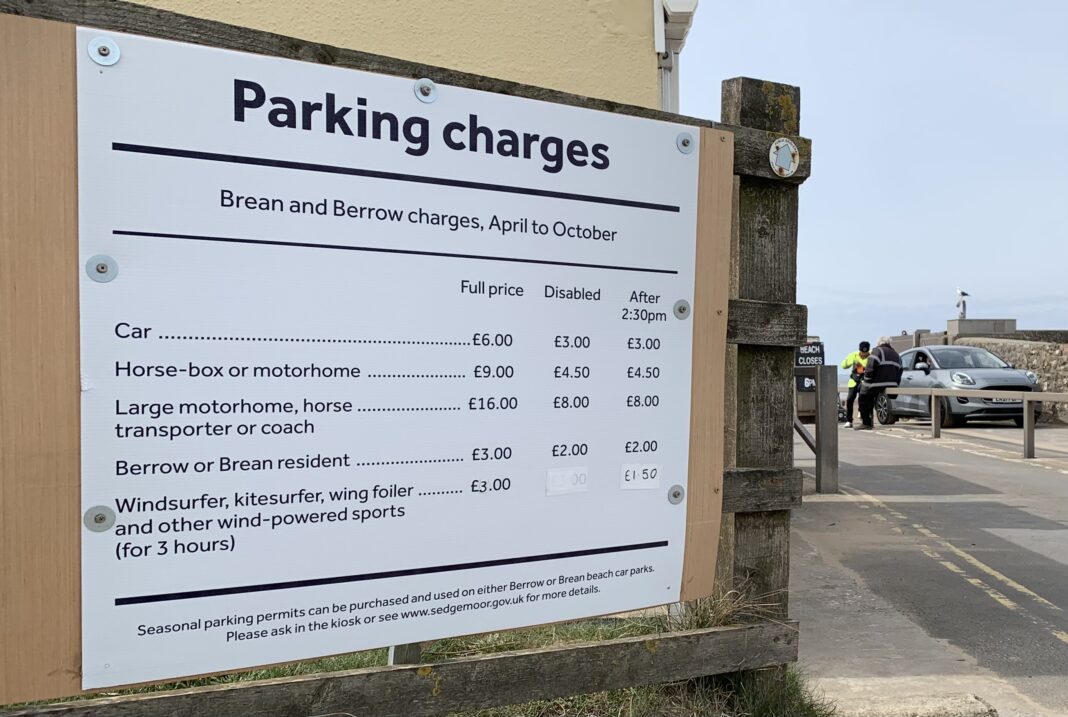Council tax bills will increase 5% and the cost of parking on Brean and Berrow beaches is also set to rise when a new unitary council takes over from Sedgemoor District Council in April.
It comes as Somerset County Council and the four district councils – Mendip, Sedgemoor, Somerset West & Taunton and South Somerset – will officially cease to exist on April 1st when they are replaced by the new unitary Somerset Council.
The new council will set its very first budget on February 22nd, needing to plug a budget gap of more than £38m in light of increased demand for children’s services and adult social care.
Among the proposed changes is a plan to generate “at least £10,000 of extra income” per year by increasing parking fees at Berrow and Brean Beach by 50p per vehicle per visit.

Somerset taxpayers will also see their council tax bills rise by the highest amount possible in the first year of the new unitary council – nearly five per cent.
For the average Somerset taxpayer (known as Band D), council tax bills will rise to £1,646.04 per year – or a total of £135.95 per month.
This comprises of £1,434.93 of general council tax (a rise of £46.88), £196.46 for adult social care (a rise of £31.36), and £14.65 to fund the Somerset Rivers Authority.
Until recently, the highest increase in council tax which could be implemented in a council’s annual budget was 2.99 per cent – comprising 1.99 per cent for general revenue and one per cent ring-fenced for adult social care.
If a council wished to raise council tax by a higher amount, it would have needed to hold a referendum, with the public getting to vote directly on the increase. However, Levelling Up Secretary Michael Gove MP announced last year that this maximum amount would be increased to 4.99 per cent – with 2.99 per cent for general spending and two per cent ring-fenced for adult social care.

On top of the council tax rise, more than £38m of savings are being implemented, designed to streamline Somerset’s public services and make them cheaper to run in the years ahead.
Numerous savings involve removing duplication as the functions of the five existing councils merge into one new authority.
These include a reduction in the number of senior managers (£2.9m), lower pension costs as a result (£7m) and standardising IT and mobile phones (at least £595,000). A further £564,000 will be saved purely by the total number of councillors across Somerset going from 320 to 110 overnight, with fewer people claiming allowances or travel expenses.
In total, around £15.7m of the necessary savings come from administrative reorganisation, with contracts being consolidated to reduce running costs – in other words, changes which should not impact on the running of front-line services.
A further £3,076,000 is being saved following the full implementation of the Recycle More programme, with the new kerbside collections being more cost-effective than the previous regime.
However, some duties of the existing councils will not be taken forward in-house, will be reduced or will be delivered in a way which is more cost-efficient.
Up to £5m will be saved by streamlining adult services through “process improvements”, with full details expected to be published by the budget meeting on February 22.
A further £3.5m will be sources from consolidating the numerous disabled facilities grant services within the existing councils, making it easier and cheaper for people to get improvements which allow them to stay in their own homes for longer.
In children’s services, £1,269,000 will be saved through improved family safeguarding, with early intervention by officers and social workers reducing the need for children to be taken into care.
Up to £820,000 will also be generated through moving children from external care placements to new children’s homes in Somerset, run by the Shaw Trust.
A further £130,000 will be generated by renting out more spaces within the Gateway park and ride site in Taunton to “external organisations” – such as EDF Energy, which allows them to transport staff between Taunton and the Hinkley Point C construction site.
The council hopes that a further £60,000 of extra income can be generated by more people using the park and ride sites, building on the new cheaper fares and Taunton fare zone which has been implemented recently.
£11,000 will also be saved by not providing paper copies of national newspapers at public libraries which will include Burnham-On-Sea Library.
By focusing the cuts on administration and back-room areas, the council says it has been able to protect front-line services and commit more money where it is needed.
Adult’s services will see an additional £28m of funding in 2023/24 compared to the previous year, while children’s services will get an extra £18.8m. There will also be no cuts to the grants provided to voluntary sector organisations which rely on council support – including Citizens’ Advice.
A further £300,000 has been allocated for the new local community networks (LCNs), which will bring together councillors and local organisations to create plans of how communities will change in the years to come.
Jason Vaughan, the council’s director of finance and governance, told the council’s executive committee in Taunton on Monday (February 13th) this additional funding was impressive given the financial pressures being felt across the UK’s public services.
He said in his written report: “This has been achieved despite the budget being impacted by financial challenges facing all councils.”
“We have set out a balanced budget, but it will require members to make some difficult choices. Like a lot of councils, failure to make those tough decisions will lead to reserves being exhausted and the likelihood of a section 114 notice in the next couple of years could not be ruled out.”
The full council will meet in Bridgwater on February 22nd to approve the final budget, notes the Local Democracy Reporting Service. If the budget is passed, residents will receive their new council tax bills in the post ahead of the new financial year, which starts on April 6th.







